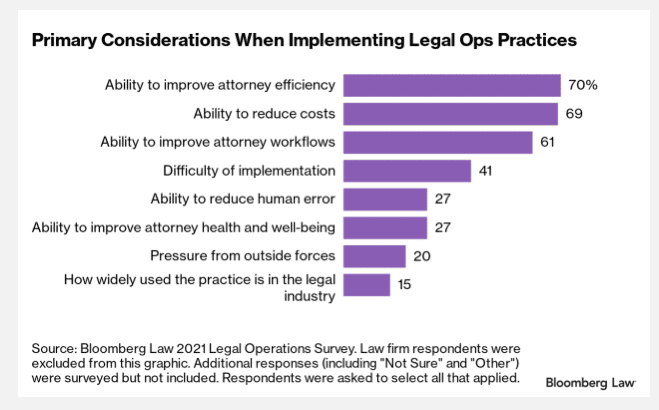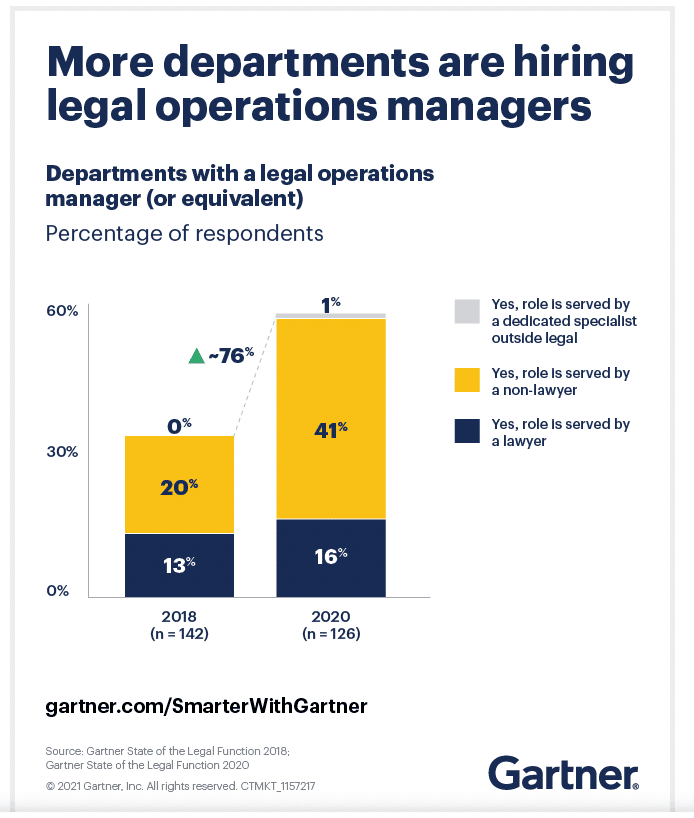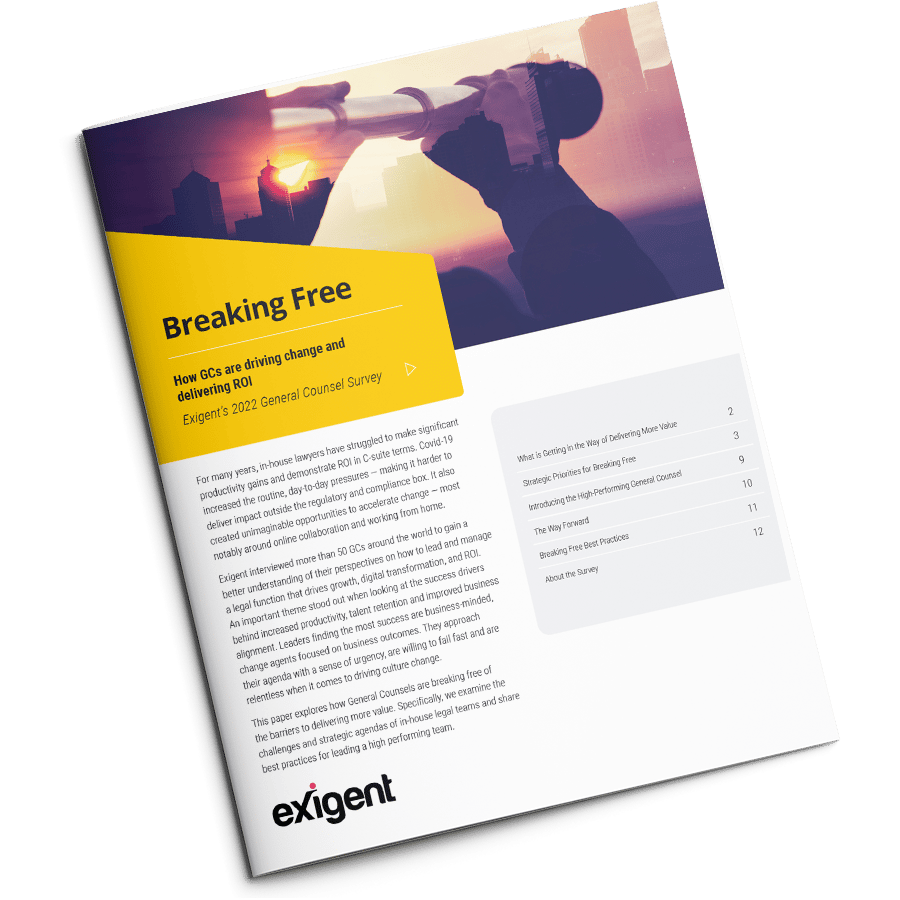The attention towards legal operations has never been greater thanks to significant growth in technology and increased reliance from C-suites on their legal departments to innovate and problem-solve. However, you already have your hands full as a GC with managing cases and giving legal advice, let alone finding time for legal ops.
With our guide, get your quick lesson on the essentials in legal operations to grow your legal department and showcase its value as a strategic partner to your C-suite or board.
Key Takeaways
- Several functions make up modern legal operations and involve legal spend management, strategic planning, change management, and delivering better legal products through technology.
- Creating a plan for implementing various legal operation projects will help you prioritize immediate needs and stay accountable with your vision for the future of your legal department.
- Consider hiring legal operations specialists to leverage their experience and offload some of the work, so you can focus on your high-value attorney work.
- Implementing technology and legal data analytics will give you more opportunities to identify areas of improvement and measure success over time through the use of KPIs.
Defining Legal Operations
Legal departments serve many roles for their C-suite executives and other corporate departments. As a GC, you’re a compliance officer, negotiator, risk adviser, and key member of the strategy team. All these roles require a variety of legal workflows and processes to accomplish your ends, which is where legal operations find their purpose. Simply stated, it’s the focus on how you achieve your legal department’s objectives with attention toward optimization.
The Evolution of Legal Ops Over Time
Historically, the role of the general counsel was to mostly manage outside counsel as they worked on litigation, transaction, and regulatory matters. Legal operations in this role meant being the primary point of contact and ensuring outside counsel had the information necessary to do its job.
That understanding of legal operations expanded over time to include a greater degree of strategy and analysis when managing outside legal counsel. Specifically, corporate executives wanted spending information on outside counsel and insight into various risks of legal matters. Modern legal operations are more advanced than ever as legal departments are seen as repositories of valuable data and have a firm position as business partners.

- Improving efficiency and cost are the main forces behind installing new legal ops practices or improving current legal workflows.
Essential Functions of Legal Ops for the Modern Legal Department
The Corporate Legal Operations Consortium (CLOC) identifies 12 core functions necessary for establishing excellence in your legal operations. They are:
- Financial management: Also known as legal spend management and covers how you allocate resources across the department with staffing legal talent and other costs.
- Firm and vendor management: A subset of legal spend management that focuses on your costs using outside counsel and other vendors such as consultants.
- Project management: Building teams and systems to execute critical programs and initiatives across your legal department and its company. For example, contract training for a sales team or employment law training for human resources.
- Practice operations: Find ways to maximize the time of your legal department’s attorneys by allowing them to focus on practicing law rather than the logistical and operational issues that often arise.
- Knowledge management: Designing systems for effectively capturing institutional knowledge that allows for seamless change management and avoids knowledge being lost or siloed.
- Information governance: Rules and protocols for how your legal department exchanges information with internal and external parties with the goal of risk mitigation and loss prevention.
- Business intelligence: Optimizing your ability to make decisions for the legal department as a GC through access to data analytics and other intelligence.
- Organization optimization and health: Cultivating legal talent through training, promotion, and proper succession planning.
- Training and development: Your processes for onboarding legal talent, administering CLE compliance, and providing opportunities for acquiring high-value skills.
- Strategic planning: Providing your legal department with a clear mission and objectives in the short, medium, and long term. Building resiliency for change management is another priority under this core function.
- Service delivery models: Having a clear vision for the best methods of delegating legal work across your in-house team, outside counsel, and ALSPs, so you are utilizing your legal talent efficiently.
- Technology: Creating a picture of how technology will play a role in your legal department and staying aware of new advancements that create added opportunities for incorporation.
Several of these core functions overlap with each other, and their overall priority within your legal department will depend on its unique needs and future goals.
The Tools and Resources for Building Effective Legal Ops
Knowing where to start in optimizing your legal operations can be a challenge because of our fast-paced environment which makes it easy to feel like you’re behind. However, seeing the forest through the trees is essential for productive and sustainable legal ops efforts. Consider the following tools and resources for advancing the state of your legal operations
A Primer on Legal Operations
Design and Execute a Strategic Plan for Advancing Your Legal Operations
Much of legal operations is about implementing strategies for your projects and processes. Naturally, it’s important to also have a plan for your legal operations plans. You won’t be able to do everything at once but setting priorities and goals will help you authentically build over time.

- A growing number of GCs are better understanding the value proposition of having legal operation specialists on their team to manage various efforts.
Involve Legal Operation Specialists Early
GCs and practicing attorneys are great at knowing the law, managing clients, and reaching desired outcomes. However, the business side of legal operations can be unfamiliar territory, in addition to the reality that you might not have the time to properly dedicate to moving things forward. Involving legal operation specialists early in the process can help you gain traction and reach your goals faster.
Incorporate Legal Technology and Legal Data Analytics
Undertaking legal operation initiatives is a worthwhile endeavor for optimizing your legal department. But how do you know when it’s working? The truth is, without quantifiable data on your legal operations, you have no way of verifying the condition of your legal operations. This is where legal data analytics becomes an essential element of your department’s strategic planning. Establish your key performance indicators (KPIs) and automate through legal technology to gather available data you can analyze and act upon.
Exigent: Your Partner for Legal Operations
Exigent values the use of AI, technology, and legal talent to help legal departments create value for their organizations. We offer an array of services that are essential to implementing effective legal operations, whether it’s contract management or insights on your legal spending. In addition, our legal technology and AI tools place the power in your hands to further drive progress in your legal workflows.
If you have questions about how our team can best help your legal department, consider reaching out to one of our representatives. Whether optimizing a specific process within your legal department or providing ongoing support, Exigent is here to help.
Contact Exigent today for a consultation about how we can help your legal operations.
About the Author:
Exigent is an Alternative Legal Services Provider (ALSP) breaking industry boundaries and raising the bar for data-driven decision-making. With a powerful combination of technology, legal expertise, and business acumen, Exigent creates expert solutions that drive better legal and business outcomes for law firms and corporations.
Exigent delivers scale, expertise, and insights that generate bigger returns for CLM – Contract Lifecycle Management, Legal Spend Management, e-Billing, Due Diligence, Document Review, eDiscovery and Litigation Support, Commercial Services, Regulatory & Compliance, Outsourced Legal Administration, and Legal Tech Design.
Follow us on LinkedIn and Twitter to transform the way you do legal.
The Exigent 2022 Annual GC Survey: Breaking Free

General Counsels Reveal ‘Secret Sauce’
We interviewed 50 GCs around the world to explore how they are breaking free of the barriers to delivering more value.
Download to learn:
- Several common challenges GCs faced in their transformation process and what they did about them
- Which priorities successful GCs handled first to achieve desired outcomes
- 5 Best-Practice Tip Sheets for how to “Break Free” of barriers to transformation for each strategic priority
- The 6 Key Traits of High-Performing GCs
















